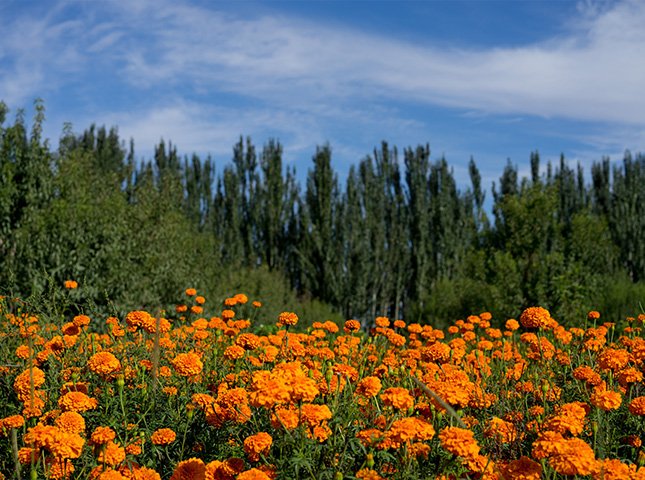Deer typically avoid eating marigolds due to their strong scent and unpalatable taste.
These vibrant flowers, especially the Signet variety, emit a potent citrus aroma that acts as a natural deterrent. While deer may nibble on marigolds during food scarcity, they generally steer clear of these plants.
Marigolds’ effectiveness as a deer repellent makes them popular in areas with high deer populations. You’ll find various types of deer-resistant marigolds, including French and African varieties, each offering unique characteristics.
To maximize their deterrent properties, plant marigolds in clusters and pair them with other aromatic herbs. Proper maintenance and strategic planting can greatly enhance your garden’s defense against deer.
Table of Contents
Marigolds and Deer Behavior
When it comes to marigolds and deer behavior, you’ll find that these vibrant flowers often serve as natural deterrents in gardens. The strong citrus scent of marigolds, particularly the Signet variety, tends to repel deer, making them less likely to munch on these colorful blooms.
This characteristic has earned marigolds a reputation as a deer-resistant plant, making them a popular choice for gardeners in areas with high deer populations.
While deer may occasionally nibble on marigolds when food is scarce, they generally avoid these flowers due to their unpalatable taste and odor. The vibrant colors of marigolds not only enhance your garden’s aesthetics but also contribute to their effectiveness in deterring deer.
Types of Deer-Resistant Marigolds
Now that we’ve explored how marigolds influence deer behavior, let’s look at specific types of marigolds known for their deer-resistant qualities. Several varieties of marigolds have proven effective in deterring deer, thanks to their strong scents and aromatic properties.
Here are five notable deer-resistant marigold types:
- Signet Marigold: Thrives in zones 9-10 with a strong citrus scent
- French Marigold: Pungent fragrance and vibrant colors
- African Marigold: Larger variety with bold blooms and deer-deterring scent
- Continuous Blooming Marigolds: Flower from spring until frost
- Marigolds with Height Variation: Range from 6 inches to 4 feet tall
These deer-resistant marigolds offer versatility in garden design while providing protection against grazing.
The marigold height variation allows you to create diverse landscapes, from low-growing border plants to taller background specimens.
French marigolds adapt well to various soil types, making them suitable for different garden environments.
African marigolds, with their extensive growing zone range (2-11), offer widespread applicability.
Planting Strategies for Deterrence
To maximize the deer-deterring potential of marigolds, you’ll need to employ strategic planting techniques that amplify their effectiveness.
Begin by selecting Signet marigolds, which emit a potent citrus scent that deer find particularly unappealing. Plant these in clusters throughout your garden to create concentrated pockets of fragrance. This approach not only intensifies the scent barrier but also helps mask the odors of more palatable plants nearby.
Integrate marigolds with other deer-resistant plants to enhance the overall scent profile of your garden. Consider interplanting them with aromatic herbs like mint or lavender, creating a fragrant barrier that deters deer while adding visual interest. For added protection, utilize elevated planters or containers to keep marigolds out of reach, especially if you’re growing varieties that grow several feet tall.
Timing is essential when implementing these strategies. Late spring is an ideal period to establish your marigold defenses, allowing them to mature before peak deer activity.
While marigolds won’t produce loud noises to scare off deer, their strong scent serves as a silent yet effective deterrent. By strategically positioning these plants, you’ll create a robust defense against deer intrusion in your garden.
Complementary Deer-Resistant Plants
While marigolds serve as a powerful deer deterrent, pairing them with other resistant plants can create an even more formidable defense against garden intruders. In early summer, when deer activity often increases, consider incorporating these complementary plants alongside your marigolds:
- Floss Flower
- Verbena
- Lavender
- Aromatic herbs
- Other strongly scented flowers
These additions not only enhance your garden’s aesthetic appeal but also reinforce its deer-resistant properties. Lavender, for instance, complements marigolds’ citrus scent with its own aromatic qualities, creating a multi-layered sensory barrier.
By strategically combining plants of varying heights, you can create a visually interesting and effective deer-resistant landscape.
When planning your garden layout, consider the growth habits and sun requirements of each plant. Marigolds thrive in full sun, so pair them with similarly sun-loving companions.
This approach not only deters deer but also promotes a healthy garden ecosystem by attracting beneficial pollinators. By diversifying your plantings, you’re creating a robust defense system that leverages the unique properties of each plant species, making your garden less appealing to deer while enhancing its overall vitality and visual charm.
Marigold Maintenance in Deer-Prone Areas
Maintaining marigolds in deer-prone areas calls for a strategic approach that maximizes their natural deer-repelling qualities while guaranteeing their health and vigor. To achieve this, you’ll need to focus on proper placement and care.
Start by selecting a location that receives full sun, as this will promote robust growth and abundant blooms, enhancing the marigolds’ deer-deterrent properties.
When planting, guarantee the soil is well-drained, as marigolds are drought-tolerant and prefer not to sit in waterlogged conditions. This characteristic makes them an excellent low-maintenance option for gardeners seeking to reduce deer activity.
Regular deadheading is essential to encourage continuous blooming, which not only maintains the plants’ aesthetic appeal but also sustains their deer-repelling effectiveness throughout the growing season.
To further bolster your garden’s defense against deer, consider interplanting marigolds with other deer-resistant species. This diversification creates a more complex and less appealing environment for deer, while also enhancing the overall beauty of your garden.
Alternative Deer Deterrent Methods
Beyond marigolds, you’ll find a range of alternative methods to keep deer at bay in your garden. While marigolds are effective, diversifying your approach can enhance overall protection.
Consider incorporating these additional strategies:
- Install physical barriers like fences or netting
- Use commercial deer repellents containing predator urine or egg solids
- Plant strongly aromatic herbs such as lavender, mint, or rosemary
- Employ motion-activated sprinklers or lights
- Hang wind chimes or reflective objects to create visual and auditory deterrents
These methods work in conjunction with marigolds to create a multi-layered defense against deer.
Physical barriers provide immediate protection, while aromatic plants complement the citrus scent of marigolds.
Commercial repellents offer a potent deterrent, and motion-activated devices startle deer, discouraging repeated visits.
Visual and auditory elements further confuse and deter these animals.
Frequently Asked Questions
What Is the Most Deer-Resistant Flower?
You’ll find that Floss Flowers are among the most deer-resistant options. Their lavender-blue clusters and unpalatable texture deter deer effectively. However, remember that no flower is completely deer-proof, and resistance can vary depending on local conditions.
Why Are Deer Eating My Marigolds?
You’re likely experiencing deer eating your marigolds due to food scarcity, especially in late summer or early fall. Young or stressed plants are more appealing. Your local deer population may also find certain marigold species more palatable than others.
Will Deer and Rabbits Eat Marigolds?
You’ll find that deer typically avoid marigolds due to their strong scent. Rabbits, however, may nibble on them, especially young shoots. While not foolproof, planting marigolds can help deter these animals from your garden.
What Are the Best Marigolds to Repel Deer?
You’ll find signet marigolds most effective for repelling deer, thanks to their strong citrus scent. French marigolds are also excellent, with their bitter taste. Plant African marigolds in clusters for added deterrence and to attract beneficial insects.
Conclusion
While deer generally avoid marigolds, they’re not entirely deer-proof.
You’ve learned about deer-resistant varieties and effective planting strategies to protect your garden. By combining marigolds with other deer-deterrent plants and maintaining them properly, you’ve increased your chances of success.
Remember, no single method is foolproof. It’s often most effective to employ multiple strategies, including alternative deterrent methods, to keep deer at bay and preserve your marigold displays throughout the growing season.


